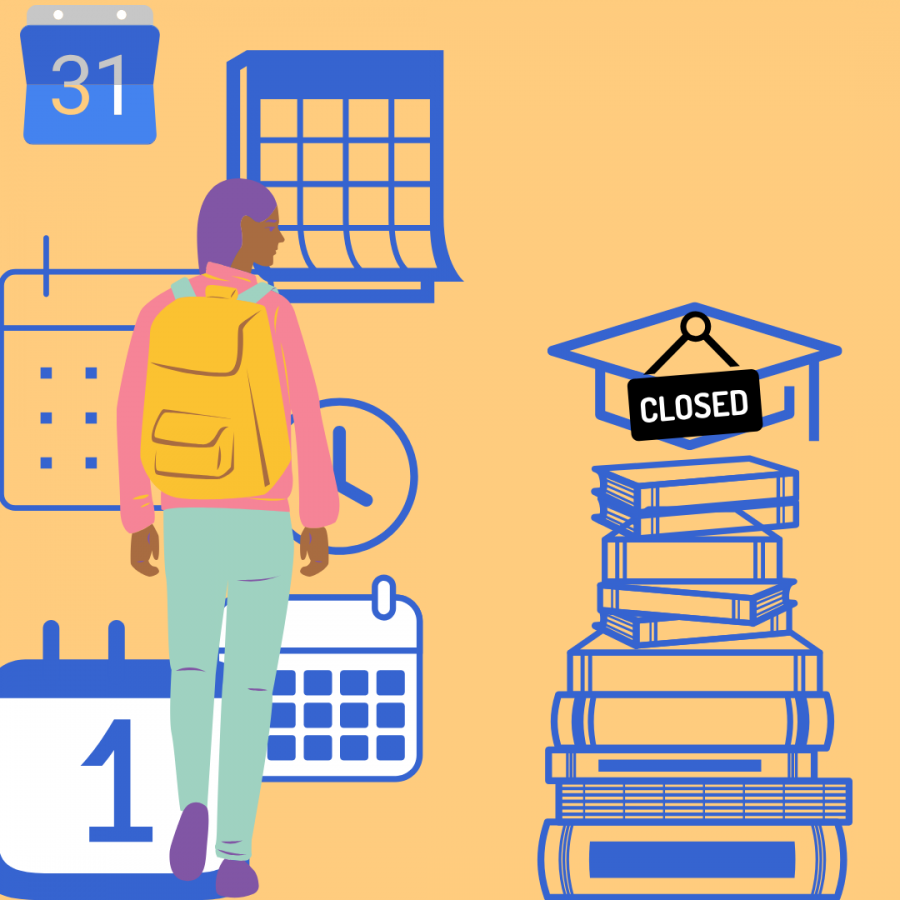The case for cancelling classes, (or at least postponing them)
May 1, 2020
Sometimes around mid-March of this year universities across the country made the difficult decision to close their dorms and move classes online. As cases of COVID-19 rose, schools realized their students, many of whom lived in crowded dorms, were at significant risk. Over the following weeks, millions of students were sent scrambling to get home or find a place to stay, myself among them.
When my dad picked me up from Washington-Dulles airport after my 435-mile journey home, I felt relief. I was sad my college year had ended so abruptly, but I knew that it was the right decision. I knew I was privileged to even have any semblance of home to return to. I’d read articles about students who were struggling with homelessness, who had to stay with friends or teachers because they couldn’t return home. I was grateful for what I had, and I was looking forward to the start of online classes. I was looking forward to the return to routine and some semblance of normalcy.
One month on and I no longer feel that way. It started around 5 p.m. on April 18 when I found myself crying at my desk. There was an article I need to read and respond to for an upcoming essay in my economic class. It was due in 4 days, but I couldn’t get access to the article. I should have an account to the news site with my student email, but no matter how many times I tried to log in it wouldn’t let me.
I contemplated emailing my professor, but I’d already emailed her twice asking for leniency. My parents need help at home, the first said, and I’m struggling to attend my online classes. My sister is sick, the second said, and we’re beyond stressed. The essay was worth 5% of my grade, and I couldn’t even read the article it was based on. Weeks of stress and confusion and uncertainty boiled up inside of me.
I’d been so sure I could handle online classes, after all, I made the Dean’s List during my first semester at college. I was getting A’s in my classes and flying through essays like I’d been waiting my whole life to write them. But now, even reading an article felt like a monumental task.
At first, I thought I was alone in this feeling, or maybe that my circumstance was unique. After a few tearful Zoom calls with my friends, I realized that I wasn’t. That we were all struggling in this new environment, at no fault of our professors or administration. The simple reality is that what is happening in the outside world is affecting us in ways our schools, no matter how student-conscious they are, will never be able to stop.
A tweet by @kamarienyausha, which has gone viral on the social media site, summarizes the experience of many students. “These online classes are emotionally and mentally draining,” she starts, “I don’t feel I’m learning, nothing is sticking. I’m so unmotivated and yet I know quitting isn’t an option. I’m stuck and I’m sick of this.”
To expect that to not affect students, at this point, isn’t just ignorance, its cruelty. I’ve already had two friends who have lost grandparents during this pandemic. One of my dearest friends lost her grandfather to COVID-19, and now her grandmother has tested positive for it as well. She wasn’t even able to attend a funeral for her grandfather. Now, she is faced with the challenge of not being able to grieve in any healthy way, while still being expected to attend her classes.
For students, like myself, who are lucky enough to have not yet experienced direct grief, COVID-19 still poses serious mental-health challenges. The anxiety that is caused by the fear that someone you love might pass away, combined with the grief caused by the mass quantities of death our society is experiencing can be debilitating.
these online classes are emotionally and mentally draining. i dont feel im learning, nothing is sticking. im so unmotivated and yet i know quitting isnt an option. im stuck and im sick of this.
— peace. (@kamarienyausha) April 16, 2020
For many students with struggling depression, substance abuse issues, or any other form of mental health illnesses for which interacting with others, getting outside, attending regular therapy are crucial to recovery, quarantine procedures can prove debilitating. Additionally, there are many of us for whom the online format simply doesn’t work. It’s been discussed at length about the struggle for students without laptops, access to reliable internet, or other technological inequalities that limit their success in such classes.
Additionally, the online classroom can pose a serious challenge to students with learning disabilities. The online classroom in-and-of-itself doesn’t work for all students, that combined with the effects of COVID-19, means the solution many universities have come up with simply isn’t sustainable. With predictions of the COVID-19 pandemic lasting well into the fall of 2020, many universities are looking at extending online learning.
My suggestion: they don’t.
Or at least, they make it optional. Rumors have been circulating among Boston college students that Boston University may be canceling their fall semester completely and pushing the school year back a semester. This would mean students would have their fall semester of 2020 pushed back into the spring of 2021, and what would be their spring semester pushed into the Summer of 2021. It’s confusing, yes, but it’s not without its merits.
With this plan, students would be freed up in the upcoming fall to do all the things that the conflicts of COVID-19 require them too, including helping to support working parents, taking care of younger siblings, and everything in between.
I admit this solution itself doesn’t address the students who rely on classes to keep busy and use them to maintain a sense of purpose and continuity. That’s why I propose we make fall semester optional. For students who need the support of the classroom, they can continue with the online format. For students who can’t, they can choose to take their classes during the summer of 2021.
What this plan would require is for universities to offer the full range of courses, housing, and dining support during the summer semester that they normally would during fall semester. They would need to find a way to keep professors on staff, and most importantly, they need to make sure that tuition isn’t more expensive than it would normally be for the traditional fall/ spring semester cycle.
Students want to keep on track with their education, they want to graduate on time without incurring more debt than they need to. But the effects of this virus, and online classes, means students are faced with the difficult decision of whether or not to take next semester off, which would delay their education, or continuing with online schooling, which would lessen the quality of their education and may cost them in terms of grades. Unusual circumstances call for unusual solutions.
The multiplicity of ways in which COVID-19 is affecting students, especially in ways that exacerbate inequalities that ALREADY posed problems for students, means there is no one policy or accommodation colleges could implement to truly address the issue.
Making fall semester optional, allows students to make the best choice for themselves and their living conditions. Students who need the continuity of classes can continue them, students who need to devote time to their families, who can’t be successful with online classes, can postpone it. For students who opt-out, they will then continue their learning during the summer of 2021.








